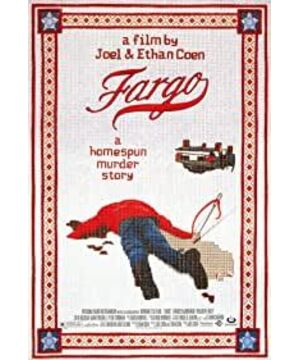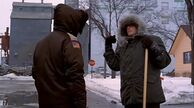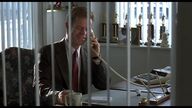Jerry is an ordinary car sales manager. And his father-in-law is a millionaire. Why does the daughter of a millionaire marry an ordinary white-collar worker who has no career success? As soon as the woman appeared on the stage, everyone found the answer: this is a housewife who is neither attractive nor attractive, with a strange pronunciation that is almost funny, and her eyes are a little confused. But the rich father-in-law obviously didn't think Jerry had done a good deed. He looked down on this boring son-in-law from the bottom of his bones. Therefore, when the son-in-law proposed to invest in the parking lot project, the old man still did not show any interest. And he clearly told Jerry that there is no need to worry about the future of the mother and son! Obviously, deep down in his heart, he has already separated his daughter's grandson from his son-in-law.
Since the old man is so ruthless and righteous, Jerry doesn't need to be polite. As a result, a plan to take risks to kidnap his wife for ransom began to brew. However, Jerry is still a loser in this new business. Not only was he late for an appointment, but he had no experience. I didn't see at all that the kidnappers sitting opposite were two guys who succeeded less than failed. Stupid villains are always Cohen's favorite crime comedy movies. Because bad guys can commit crimes, and stupidity can produce jokes. The two stupid bandits have a sharp contrast in image and character characteristics. The big man has a terrible and reticent face, while the little one is funny but talks all day long. The episode where the two of them hired prostitutes in the hotel was very interesting. At first, there was a lively sex scene, and then the position of the camera remained unchanged, but the scene turned into the last four people lying peacefully on the bed watching TV after the incident. Watching TV is a normal thing. However, the Coen brothers produced a weird humorous effect through the combination of actor Munner's expression and clever lens position. Similar shots have repeatedly appeared in other works of the brothers.
The development of Lao Zhangren's behavior trajectory is also very reasonable. He suddenly called Jerry and said that he had changed his mind. This surprised the latter and was busy looking for contacts to cancel the kidnapping plan. But later we learned that although the old man was planning to invest, he wanted to exclude his son-in-law. For Jerry, this is undoubtedly a greater humiliation than refusal... So far, the story has two twists and turns, but the characters have always remained the same: The old man just looks down on his son-in-law. This is clever screenwriting skills. On the other hand, in some mediocre Hollywood film and television works nowadays, many characters often change their positions at will simply to create suspense and thrillers. For example, in the second part of "Prison Break", the young woman who provided the brothers with a car to use in their escape, and the presidential agent who finally defied.
A confusing scene. A scene where a
female sheriff meets a male classmate has puzzled many people. According to the film critic Rosenbaum: This episode actually shows a lonely person forced to lie in order to conceal his despair. Roger Albert, who holds a similar view, further added that Mike, an Asian man, is actually Jerry's mirror. After the female classmate exposed Mike's lies on the phone, Maggie had the inspiration to connect the two men. And he also believes that such a plot arrangement is better than letting her crush Jerry mentally the first time she talks. The story will become more tortuous and vivid...Although I basically agree with the above interpretation, but at the same time, I also believe that understanding the meaning does not mean that it is absolutely reasonable. Because, I have to admit that the obscure expression of this plot does not match the simple and clear overall story line of the film. And this may be one of the reasons why people are confused about it.
Relatively speaking, I still prefer the comedy elements in this scene. The female police chief who is pregnant with Liujia and her Asian male classmate who has a long crush on her Fearing that your stall will become the next target of an emotionally out-of-control black mob and yelling "I am also black!" is quite funny) "Dating" itself has a comedic selling point. The excellent interpretation of the two actors makes the story more lively and interesting. When she found that the man was sitting next to her from the opposite side in order to get close, Maggie with a nice smile immediately raised her face and said solemnly, "I want you to sit back!" Then, to avoid embarrassment, she hurriedly piled up again. The smile rounded up, "It's mainly because I feel too tired to talk with my head sideways." The perfect combination of facial expressions and lines highlights the female police chief's personality traits of being good at communicating with others.
However, Maggie, who is good at communication, also has a bad time. Asking the two girls to find out the whereabouts of the kidnappers made her feel a little big head. They are indeed very cooperative and the conversation process is also very relaxed and enjoyable. The local accent of "Yeah, yeah" is endless. But when asked about the real, the specific characteristics of the suspect, the other party's answer (perhaps the most funny line in the film) made Maggie wonder what to say: "Is that little guy? He has a foreskin..." Self
-contained human nature trial The
Cohen brothers have their own system of judging the ugly human nature: money is the source of all evils; selfishness, arrogance, and greed are more ugly than stupidity, lies, and even killing; the host of ugly humanity (That is, the characters in the film) must be punished accordingly. In this system, the old man is not a victim. He rejected the son-in-law's project out of arrogance. Later, although he changed his mind, he wanted to exclude Jerry. And bargaining on the issue of the amount of the daughter's ransom is to magnify the selfish ugliness to the extreme. In the end, he who insisted on paying the ransom himself lost his life because of a needless argument with the kidnappers.
Interestingly, the little kidnapper who took his life also showed similar character traits and fate trajectory. He also thinks that Lao Tzu is the biggest. All matters such as gang negotiations, board and lodging must be arranged by him. But in fact, he is also the worst in business. Encountering a highway interrogation and killing a policeman, on the surface it was the impulse of the big man, but in fact it was the incompetence of the small man. He was already panicked and overwhelmed. When Jerry's wife was kidnapped, it was discovered that the open bathroom window was a scam, and it was still not him. But the little man ignores his own shortcomings and the strengths of others. When the wooden house divides the spoils, he always insists that he should take more. Even if he embezzles a million ransom, he will be furious for a car. Naturally, it can only be served by the chainsaw.
And Jerry can be in the same category as the big man. They are all in a relationship that should have been more stable and reliable (weng-in-law relationship, partner relationship of criminal gangs), but they have suffered unfair treatment from the other side of the relationship for a long time. In this regard, they have been dissatisfied. When the dissatisfaction accumulated to a certain critical point, both of them chose to retaliate by extreme means: Jerry kidnapped his wife; and the big man wielded a chainsaw. In the view of the Coen brothers, these two criminals, who are full of legal aspects, have something to sympathize with. So even though Jerry was the mastermind in the big kidnapping case, the big man was the culprit of many bloody murders, but in the end he did not deprive his life mercilessly like the old man and the little man, but was only relatively "tolerant" in the car. The hotel was knocked to the ground by the police, and a female police chief shot him in the leg and escorted him into a police car.
Comparison with "Old Nowhere"
The film and "Old Nowhere" are indeed quite similar in subject matter, but there are also strong contrasts. The most important difference comes from the role. Sheriff Maggie is the perfect representative. She was witty and courageous, with outstanding abilities. She achieved the position of sergeant in the police station and eventually succeeded in sabotaging the case. At the same time, he is humorous, amiable, good at communication, and all kinds of interpersonal relationships are well handled. For example, when investigating the scene of a highway homicide, she did not laugh at her male colleague because of his slow response, but merely expressed her opinion euphemistically. During the meeting with her former classmates, she did not make people unable to get off the stage with a cold face because she didn't like each other (as written above). More importantly, she will not be swayed by money. As the monologue in the police car at the end of the film said, "There are more important things in life than money. Don't you know? What a beautiful day." The old sheriff, played by Tom Lee Jones, is at best a copy of Maggie's Partial personality. However, his ability has declined significantly, and he can no longer adapt to the intriguing modern society. Although we can rely on experience to predict certain things in the process of handling the case, it is always slow: from checking Moss's RV behind the killer, to driving to protect Moss from behind the Mexicans, and finally to Go back to the hotel where the incident occurred at night to let the killer escape.
On the other hand, the criminals in "Ice Blood Storm", both Jerry and the kidnappers have all kinds of abilities. Or selfish, or stupid, or greedy, or impulsive. These flaws made them doomed to fail in the confrontation with Maggie. This is not the case in "Old Nowhere". Handcuffs killing police officers, electric pumps killing passers-by, breaking into the office and killing employers, in addition to showing the cruelty of the killer, it also shows that this person has a very high professional quality. Moss is the representative of cunning. He hid the cash box tightly in the ventilation holes, rented another house and hooked away the cash box in times of crisis, and returned to the hotel to wait for the ambush after a surprise attack and jumped out of the window. . Even Mexican gangsters with few shots have extremely high criminal IQs. In both pursuits of Moss, he locked the target before the killer. The second time to track and deceive the mother-in-law was even more clever. Killers, Moss, Mexicans, they are the strongest in this survival society of the weak and the fittest. Therefore, no matter what the purpose is to rescue and arrest, the old police chief has nothing to do.
In addition, the causal view of good and evil presented in the storyline is completely reversed. In "Ice Blood Storm", if the old man chooses to trust others (although he is still deceived) at the critical moment of paying the ransom, instead of sticking to his own opinions, he can at least save an old life. Similarly, if a small man who has embezzled a million ransom can give up his car to the other party a little more rationally, he will not end up being divided. Their deaths stemmed from non-"goodness." But the death of Moss in "Old Nowhere" was precisely because of "goodness": the conscience discovered that he returned to the desert to send water, and unfortunately encountered the Mexicans. Although he escaped by chance, the car on the slope completely exposed his identity. Many people believe that even if Moss does not return to the desert, he will be found. Because there is a tracker in the cash drawer. Personally do not agree with this view. The tracker is a precise positioning tool, and only after knowing the general direction of the target can it be accurately positioned. And if the culprit doesn't even know who took the money, the tracker is just a display.
View more about Fargo reviews










